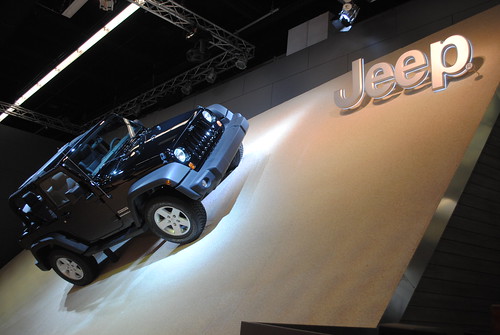Opt for the uber-cool Turbo Diesel on the Jeep Wrangler and you get some cutting-edge technology for 2012. The new CRD engine comes equipped with Start/Stop technology - the first application of this technology on a Jeep vehicle.
With Stop/Start, the diesel engine is shut off when the vehicle is stopped, the shift gear is in Neutral, and the clutch is released. The engine then restarts automatically when the clutch pedal is depressed. Drivers can deactivate the technology via a button on the dashboard, and an icon displays in the instrument panel to indicate the Stop/Start status.
An upgraded starter and alternator improve durability, and a DC/DC power converter maintains electronic feature functionality while the vehicle is stopped.
Stop/Start technology improves fuel efficiency and reduces CO2 emissions by managing the amount of time the engine runs.
Fuel economy is improved by up to 13-percent, and CO2 emissions are reduced by up to 14-percent.
Love to see this technology come to the states.
Photo courtesy of Autoviva.
This is where you try to paint yourself in a box. That's not going to happen here. Sometimes I wander beyond the lines of a typical copywriter. I dabble in content strategy, search, etymology, branding, research, history, green technology, alternative fuels - and a whole lot more. Hope it's an enjoyable read.
Showing posts with label Efficiency. Show all posts
Showing posts with label Efficiency. Show all posts
Thursday, October 20, 2011
Monday, March 8, 2010
World Record Fuel Economy
 Have we reached the plateau of fuel efficiency? Turned the last screw in our push toward the envelope of known technology? At first I couldn't believe the claim: over 12,000 miles per gallon. Now I can't believe it hasn't been improved upon.
Have we reached the plateau of fuel efficiency? Turned the last screw in our push toward the envelope of known technology? At first I couldn't believe the claim: over 12,000 miles per gallon. Now I can't believe it hasn't been improved upon.The Guinness World Record for fuel efficiency was awarded in 2005 to a Swiss team with a PAC-Car II hydrogen-powered car. Lino Guzzella and his team at ETH Zurich recorded an astounding 5,385 km per liter of gasoline (12,666 mpg!) during the Shell Eco-marathon in Ladoux (France). The vehicle weighed a feathery 60 pounds and had an aerodynamic drag coefficient of 0.075.
Hydrogen power is impressive, but it still doesn't compete with the sun-fed system of solar vehicles. The solar car can travel an indefinit
 e distance without using any fuel at all (provided sun is readily available). I was shooting the event for The Macomb Daily newspaper on July 19, 1990 as the University of Michigan Sunrunner crossed the finish line and won the first GM Sunrayce. It was a memorable event seeing the maize and blue solar cell-covered car stealthily cross the finish line with a a cheering team in tow at the General Motors Tech Center in Warren, Michigan. Th
e distance without using any fuel at all (provided sun is readily available). I was shooting the event for The Macomb Daily newspaper on July 19, 1990 as the University of Michigan Sunrunner crossed the finish line and won the first GM Sunrayce. It was a memorable event seeing the maize and blue solar cell-covered car stealthily cross the finish line with a a cheering team in tow at the General Motors Tech Center in Warren, Michigan. Th e Sunrunner electric car weighed a heafty 500 pounds and had an aerodynamic drag coefficienct of .108.
e Sunrunner electric car weighed a heafty 500 pounds and had an aerodynamic drag coefficienct of .108.Solar powered vehicles have matured and improved at an astonishing rate since that momentous event in 1990. The race to higher fuel efficiency with hydrogen powered vehicles is sure to follow a similar path, albeit not as dramatic. The fact that Hydrogen became a recognized official fuel in 2004 like gasoline and petrol helped with the path to world records.
So why hasn't another team broken the record since? Have we reached the epitome of drag coefficiency. Has the tire technology reached its limit? Or is it just that the students at ETH Zurich are taking a break for a while as everyone else catches up?
(PAC-Car 2 photos courtesy ETH Zurich)
Subscribe to:
Posts (Atom)
